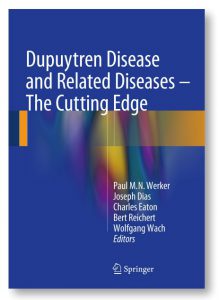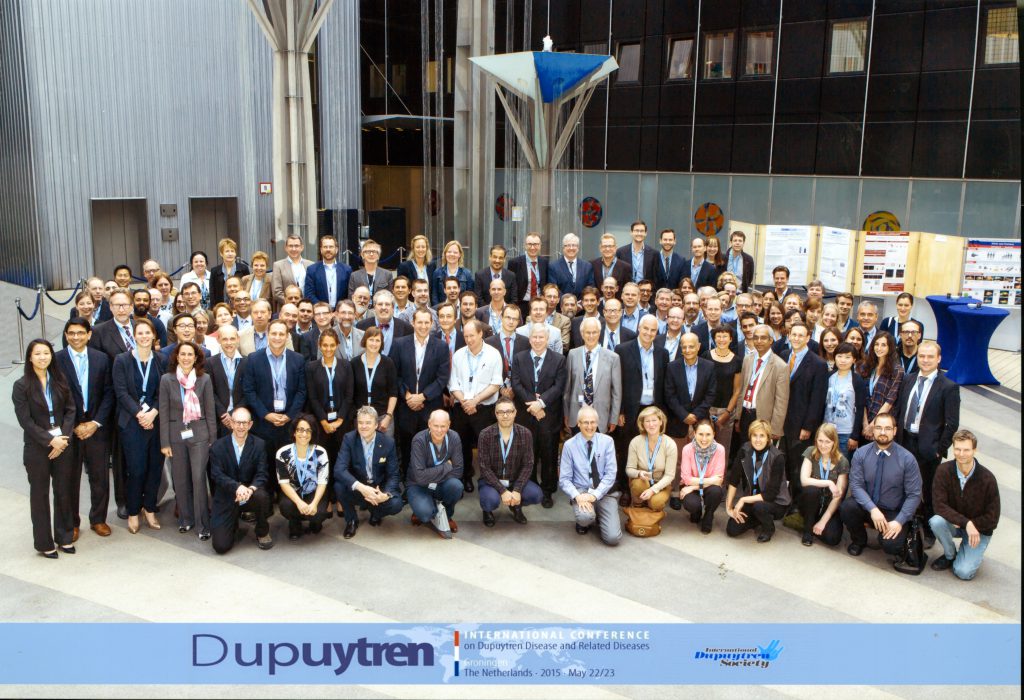INTERNATIONAL SYMPOSIUM ON DUPUYTREN DISEASE
This conference was organized by the International Dupuytren Society, hosted by the University Medical Center Groningen UMCG and supported by the Federation of European Societies for Surgery of the Hand FESSH and the International Federation of Societies for Surgery of the Hand IFSSH. The conference included academic research presentations and panel discussions regarding Dupuytren disease and related conditions. The goal of the conference has beenraising awareness regarding Dupuytren disease, sharing new concepts and ideas, and promoting cooperative efforts to work for a cure.
The symposium was a gathering of researchers and clinicians with a wide spectrum of interests: cell biology, genomics, surgery, pharmacotherapy, radiotherapy, biomechanics, therapy, as they relate to Dupuytren disease and related conditions. The conference was held at
22 / 23 May 2015, Groningen, The Netherlands
Accredited by EACCME for 12 CME points. Accredited by the Nederlandse Orthopaedische Vereniging (NOV)
and the Nederlandse Vereniging voor Plastische Chirurgie (NVPC) for 16 points.
The Groningen conference followed the symposium held in May 2010 in Miami, Florida (Conference History). Results of that conference have been published in Charles Eaton, Heinrich Seegenschmiedt, Ardheshir Bayat, Giulio Gabbiani, Paul Werker, and Wolfgang Wach (Eds.) “Dupuytren’s Disease and Related Hyperproliferative Disorders” Springer, 2012 ebook.
The proccedings of the Groningen conference have been published as book by Springer in 2016 proceedings.

International Conference on Dupuytren Disease and Related Diseases
Groningen, The Netherlands
22 / 23 May 2015
Scientific Program
Note that the proceedings of this conference will be published by Springer as a book (printed and ebook) and will probably appear in June/July 2016.
Conference Program as PDF
Abstracts of presentations on Friday (including posters): abstracts_Friday
Abstracts of presentations on Saturday: abstracts_Saturday
Day 1 Friday, 22 May 2015
| 08:30 | Paul Werker | Opening the conference | |
| 08:35 | Jos Aartsen | Welcome from the CEO of UMCG | |
| 08:40 | Wolfgang Wach & Charles Eaton | Welcome from the International Dupuytren Society & the Dupuytren Foundation | video |
| Session 1 | Epidemiology and Patients’ Views | B. Reichert, Z. Szabo | |
| 08:45 | Zsolt Szabo | Lecture : Treatment of Dupuytren in different countries and the role of FESSH and IFSSH in promoting knowledge for hand surgeons | video |
| 09:05 | Joseph Dias | The epidemiology of surgical intervention for Dupuytren Contracture in England | video |
| 09:11 | Bert Reichert | Favorite Options of German Hand Surgeons in the Treatment of Dupuytren Disease | video |
| 09:17 | Philip Blazar | Trends in Dupuytren’s Treatment in the United States | video |
| 09:23 | Discussion | ||
| 09:38 | Wolfgang Wach | The Patient’s View and Needs – An International Survey: Dupuytren Disease | video |
| 09:44 | Hester Kan | Patients’ preferences for treatment for Dupuytren disease: a Discrete Choice Experiment | |
| 09:50 | Discussion | ||
| Session 2 | Cellular and Extracellular Events |
R. Bank, B. Hinz | |
| 10:30 | David O’Gorman | Lecture : The extracellular matrix in Dupuytren disease | video |
| 10:50 | Marianna Kruithof‐de Julio | PDGFR-β targeted modified interferon gamma in Dupuytren disease | |
| 10:56 | Marike van Beuge | Wnt pathway in Dupuytren disease, connecting pro-fibrotic signals | video |
| 11:02 | Ian Clark | Biomarkers of post-surgical outcome in Dupuytren disease | video |
| 11:08 | Jagdeep Nanchahal | Tumour necrosis factor (TNF) as a therapeutic target in Dupuytren disease | video |
| 11:14 | Discussion | ||
| 11:30 | David O’Gorman (chair) | Controversies 1: Pathogenesis of Dupuytren Disease: active or passive contracture? | |
| 11:32 | Jagdeep Nanchahal | Active Contracture | video |
| 11:37 | Charles Eaton | Passive Contracture | video |
| Session 3 | Genetics and Associations |
H. Hennies, R. Ophoff | |
| 13:00 | Roel Ophoff | Lecture : Genetics in Dupuytren Disease | |
| 13:20 | Michael Ng | A Large European Genome-wide Association Study Reveals Multiple New Genetic Susceptibility Variants for Dupuytren Disease | video |
| 13:26 | Kerstin Becker | Meta-analysis of genome-wide imputed GWAS identifies new significant loci in patients with Dupuytren´s disease | |
| 13:32 | Juanjiangmeng Du | Identification and characterization of functional genetic variants in Dupuytren Disease | |
| 13:38 | Discussion | ||
| 13:53 | Dieuwke Broekstra | A systematic review and meta-analysis on the association between Dupuytren disease and diabetes | video |
| 13:59 | Dieuwke Broekstra | The association between vibration and Dupuytren disease: a comparison between elderly field hockey players and controls | video |
| 14:05 | Discussion | ||
| 14:15 | Ilse Degreef (chair) | Controversies 2: The benefit of splinting for Dupuytren contracture | |
| 14:17 | Adrian Chojnowski | Splinting confers no benefit | video |
| 14:22 | Wolfgang Wach | Splinting is beneficial | video |
| Session 4 | Collagenase Injection |
S Coleman,S Wilbrand | |
| 15:15 | Larry Hurst | Lecture : Collagenase Treatment – Journey from Bench to Current Advanced Clinical Use | |
| 15:35 | Paul Werker | Dupuytren Disease in the thumb and first webspace and collagenase treatment | video |
| 15:41 | Jesper Nordenskjöld | Efficacy of using local anesthesia before collagenase injection in reducing overall pain experience in patients treated for Dupuytren’s contracture: A quasi-randomized study | video |
| 15:47 | Gary M. Pess | Effect of Delayed Finger Extension on the Efficacy and Safety of Collagenase Clostridium Histolyticum Treatment for Dupuytren Contracture | video |
| 15:51 | Massimo Corain | The use of a dynamic dorsal splint for Dupuytren Rehabilitation after collagenase | cancelled |
| 15:57 | Discussion | ||
| 16:19 | International Dupuytren Society | Dupuytren Award 2014 to Clayton Peimer | |
| 16:24 | Clayton Peimer | Treatment with Collagenase Clostridium Histolyticum: Five-Year CORDLESS Data | video |
| 16:30 | Marie Badalamente | Prospective Multicenter, Multinational Study to Evaluate the Safety and Efficacy of Concurrent Collagenase Clostridium Histolyticum Injections to Treat Two Dupuytren Contractures in the Same Hand | video |
| 16:36 | Marie Badalamente | An Open-label, Controlled Phase 2a Study of the Safety and Efficacy of Injectable Collagenase Clostridium Histolyticum (CCH) in Patients with Adhesive Capsulitis (Frozen Shoulder) | video |
| 16:42 | David Warwick | Collagenase : what we may never know – a discussion paper | video |
| 16:48 | Discussion | ||
| 17:04 | Charles Eaton (chair) | Controversies 3: The best minimally invasive treatment for Dupuytren Disease:PNF or Collagenase? | |
| 17:06 | Paul Werker | Percutaneous Needle Fasciotomy | video |
| 17:11 | David Warwick | Collagenase | video |
| Day 2 Saturday, 23 May 2015 | |||
| Session 5 | Assessment / Percutaneous Needle Fasciotomy |
U. Lanz, G. Pess | |
| 08:30 | Joseph Dias | MCID for the Patient Evaluation Measure as a Patient Rated Outcome Measure for Dupuytren Contracture | video |
| 08:36 | Chao Zhou | Predictors of Satisfaction with Hand Function in Patients with Dupuytren Disease | video |
| 08:42 | Joseph Dias | URAMS as a PROM for Dupuytren Contracture Patients | video |
| 08:48 | Discussion | ||
| 09:03 | Gary Pess | Tips and Pearls for Percutaneous Needle Fasciotomy and Collagenase – A Ten Year Personal Experience | video |
| 09:09 | Margot Vlot | Percutaneous Needle Fasciotomy for secondary or higher recurrence in Dupuytren disease | video |
| 09:15 | Steven Hovius | Extensive Percutaneous Aponeurotomy and Lipofilling versus Limited Fasciectomy in Patients with Primary Dupuytren Contracture; a Randomized Controlled Trial | video |
| 09:21 | Discussion | ||
| 09:37 | Joseph Dias (chair) | Controversies 4: How to treat severe PIP contractures: minimally invasive or surgically? | |
| 09:41 | Clayton Peimer | Minimally invasive methods | |
| 09:46 | Caroline Leclercq | Surgical correction | video |
| Session 6 | Comparative Studies / Recurrence |
C. Leclercq, D. Elliot |
|
| 10:45 | David Elliot | Lecture : Treatment of Dupuytren Disease – Where are we now? | |
| 11:05 | Paul Binhammer | Steroid injection and needle aponeurotomy for Dupuytren disease: long-term follow-up of a randomized controlled trial | video |
| 11:11 | Eva-Maria Baur | Minimally invasive treatment of Dupuytren: Collagenase vs. PNF |
video |
| 11:17 | Chao Zhou | Collagenase Clostridium Histolyticum versus Partial Fasciectomy for Dupuytren’s contracture: Early Outcomes From A Multicenter Propensity-Score Matched Study | video |
| 11:23 | Discussion | ||
| 11:35 | Jane C Messina | Actual Indications of Continuous Extension Technique (TEC) for Severe Dupuytren Disease | video |
| 11:41 | Atanu Biswas | Preliminary soft-tissue distraction versus checkrein ligament release after fasciectomy in the treatment of Dupuytren proximal interphalangeal joint contractures | video |
| 11:47 | Discussion | ||
| 11:55 | Rinze Zwanenburg | The Palmodigital Spiralling Sheath | |
| 12:01 | Rosanne Lanting | Clusters in short term disease course in participants with primary Dupuytren Disease | |
| 12:07 | Discussion | ||
| 12:15 | Ruud Selles | Recurrence after Treatment for Dupuytren Disease; A consensus-based definition | video |
| 12:21 | Caroline Leclercq | Recurrence after Dupuytren’s disease:the time factor | |
| 12:27 | Ilse Degreef | Is Recurrence of Dupuytren Disease Prevented by Full-Thickness Grafting Surgery? | video |
| 12:33 | Discussion | ||
| Session 7 | Related disease & Other Treatments |
R. Selles, R. Shaffer |
|
| 13:50 | Heinrich Seegenschmiedt | Lecture : Radiotherapy for Early Stage Dupuytren and Ledderhose Disease |
video |
| 14:10 | Catherine Ball | A Systematic Review Of Non-Surgical Treatments for Early Dupuytren Disease | video |
| 14:16 | Gary Manley | The Patient’s View and Needs – An International Survey: Ledderhose Disease | video |
| 14:22 | Discussion | ||
| 14:32 | Gloria Sue | Use of Acellular Dermal Matrix in Dupuytren Disease | video |
| 14:38 | Ilse Degreef | In vivo RCT Tension versus compression on Dupuytren | video |
| 14:44 | Discussion | ||
| 14:54 | Mels van Driel | Lecture : Peyronie’s Disease Treatment: The State of the Art |
video |
| Symposia | Focus on Research |
J. Dias | |
| 15:35 | Joseph Dias | Introduction to the symposia | video |
| 15:40 | David O’Gorman | Basic Research: important prerequisites for future studies | D. O’Gorman video |
| Ruud Bank | We need better methodologies for Dupuytren research | video | |
| Dominic Furniss | Requirements for genetic research and novel ways to attract funding | video | |
| 16:30 | Maria Badalamente | Clinical Research: international collaboration to execute high powered clinical trials | M. Badalamente video |
| Joseph Dias | Patient Rated Outcome Measures (PROMS) | video | |
| Charles Eaton | International Dupuytren Data Bank (IDDB) | video | |
| Steve Coleman | Clinical Research in Australia | video | |
| 17:20 | Paul Werker | Closing remarks | |

